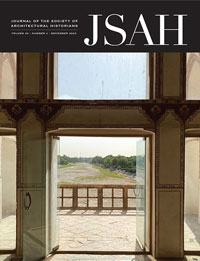-
Membership
Membership
Anyone with an interest in the history of the built environment is welcome to join the Society of Architectural Historians -
Conferences
Conferences
SAH Annual International Conferences bring members together for scholarly exchange and networking -
Publications
Publications
Through print and digital publications, SAH documents the history of the built environment and disseminates scholarship -
Programs
Programs
SAH promotes meaningful engagement with the history of the built environment through its programsMember Programs
-
Jobs & Opportunities
Jobs & Opportunities
SAH provides resources, fellowships, and grants to help further your career and professional life -
Support
Support
We invite you to support the educational mission of SAH by making a gift, becoming a member, or volunteering -
About
About
SAH promotes the study, interpretation, and conservation of the built environment worldwide for the benefit of all
Good Night: A Dazzling New Era of Metropolitan Light
Article via Places Journal
![The Bay Lights, San Francisco, project by Leo Villareal for the Bay Bridge, test run, January 2013. [Photograph: Leo Villareal, via Wikimedia]](/images/blog/the-bay-lights-san-francisco-project-by-leo-villareal-for-the-bay-bridge-test-run-january-2013.-photograph-leo-villareal-via-wikimedia-0A327D39715F.jpg?sfvrsn=c39727e2_2)
The Bay Lights, San Francisco, project by Leo Villareal for the Bay Bridge, test run, January 2013. [Photograph: Leo Villareal, via Wikimedia]
Great White Way
The lights of New York dazzled Vladimir Mayakovski when he came to visit in 1925. The revolutionary poet of modernism felt “a constant electrical breeze” in the great city, powering trains to the horizon and elevators to the stars, igniting the metropolitan elements; "the buildings are glowing with electricity,” he wrote. Bewitched, he stared hard into the dizzying views, his vision racing down the vanishing streets netted with wires and lights. [1] For Mayakovski, New York in the early 20th century was the frenzied heart of modernity, the new world metropolis where the self-conscious avant-garde aesthetic experiment of the old world was eclipsed by the unblinking gaze of blazing lamps, as if the white-hot heart of human consciousness itself were on display.
The invention of the infrastructures of artificial light, first gas, then electric, was as fundamental to modernization as was any system of transportation, communication or energy, and as momentous as urbanization itself. But for Mayakovski electric light was more than a technology of modernization; it pointed toward a certain kind of modernism, an emerging way of understanding and expressing the world. Mayakovski, along with such contemporary artists as Marcel Duchamp and Sergei Eisenstein, saw in electric lighting the end of one way of life and the advent of another. Self-mandated to see beyond the horizon, the poet, he wrote, was indebted to the harbingers of new life and, as result, always “paying out exorbitant fines and interest." "I am in debt to Broadway’s dazzling streetlamps,” he declared, as he traveled in his eager search for emotional insolvency. Urban street lighting was, for Mayakovski, nothing less than a locus of modernism.
Continue reading on Places Journal
![The Bay Lights, San Francisco, project by Leo Villareal for the Bay Bridge, test run, January 2013. [Photograph: Leo Villareal, via Wikimedia]](/images/blog/the-bay-lights-san-francisco-project-by-leo-villareal-for-the-bay-bridge-test-run-january-2013.-photograph-leo-villareal-via-wikimedia-0A327D39715F.jpg?sfvrsn=c39727e2_2)
The Bay Lights, San Francisco, project by Leo Villareal for the Bay Bridge, test run, January 2013. [Photograph: Leo Villareal, via Wikimedia]
Great White Way
The lights of New York dazzled Vladimir Mayakovski when he came to visit in 1925. The revolutionary poet of modernism felt “a constant electrical breeze” in the great city, powering trains to the horizon and elevators to the stars, igniting the metropolitan elements; "the buildings are glowing with electricity,” he wrote. Bewitched, he stared hard into the dizzying views, his vision racing down the vanishing streets netted with wires and lights. [1] For Mayakovski, New York in the early 20th century was the frenzied heart of modernity, the new world metropolis where the self-conscious avant-garde aesthetic experiment of the old world was eclipsed by the unblinking gaze of blazing lamps, as if the white-hot heart of human consciousness itself were on display.
The invention of the infrastructures of artificial light, first gas, then electric, was as fundamental to modernization as was any system of transportation, communication or energy, and as momentous as urbanization itself. But for Mayakovski electric light was more than a technology of modernization; it pointed toward a certain kind of modernism, an emerging way of understanding and expressing the world. Mayakovski, along with such contemporary artists as Marcel Duchamp and Sergei Eisenstein, saw in electric lighting the end of one way of life and the advent of another. Self-mandated to see beyond the horizon, the poet, he wrote, was indebted to the harbingers of new life and, as result, always “paying out exorbitant fines and interest." "I am in debt to Broadway’s dazzling streetlamps,” he declared, as he traveled in his eager search for emotional insolvency. Urban street lighting was, for Mayakovski, nothing less than a locus of modernism.
Continue reading on Places Journal



Leave a commentOrder by
Newest on top Oldest on top